









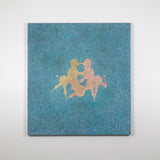
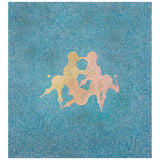
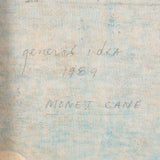
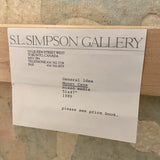
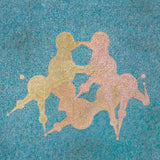
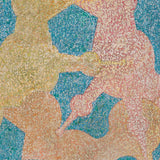
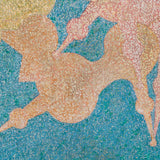
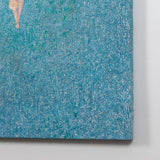
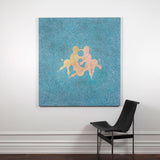
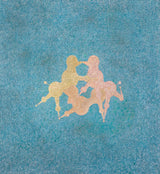
General Idea
GENERAL IDEA “MONET CANE” PAINTING, 1989
General Idea was founded in 1967 in Toronto by AA Bronson (b. 1946), Felix Partz (1945-1994), and Jorge Zontal (1944-1994). Over the course of 25 years, they made a significant contribution to postmodern and conceptual art in Canada and beyond.
The trio was both prolific and multi-disciplinary long before it became de rigueur. They worked across a wide range of media including photography, sculpture, painting, mail art, video, installations, multiples, and performance.
With their subversive approach and interest in parody and appropriation, General Idea addressed a broad range of social (and art-world) issues such as the cult of the artist, mass media, queer identity, and consumerism.
Thematic continuity was a key element for General Idea, who utilized longevity as an avenue to delve deeper into, build upon, and evolve with the complex and nuanced subject matter they took on.
“Monet Cane” is an extraordinary example of General Idea’s use of iconography, appropriation, (and mischief) from this era. Beginning in the early 1980s, General Idea began using the poodle as an emblem for the trio, quickly elevating it to one of the most dominant motifs in their practice. Both single poodles, and trios (which would be a sort of group self-portrait) appeared frequently in a variety of artwork during their last decade of production.
The 80's was a decade that saw appropriation flourish in the visual arts. General Idea made a significant contribution to this trend. While many of their contemporaries used mass-market images or objects (think Barbara Kruger, Jeff Koons, and Richard Prince) General Idea did not restrict themselves to accessible imagery but also claimed canonical images and blue-chip references.
General Idea created two major series of paintings featuring the trio of poodles; in pastels (which were often bleached in a commercial washing machine) and in neon colors.
This painting is exceptionally rare as it is one of four paintings made with this distinct flecked surface. This unique texture is a significant (and beautiful) anomaly at odds with their predominantly flat and graphic aesthetic.
The surface of the canvas is enveloped in tiny, weighted flecks of paint that have been layered to create an incredible texture. This application of paint, which appears to be chenille-like, recalls both the atmospheric pastel palette and impressionistic effects made famous by Claude Monet.
"Monet Cane" can not only be contextualized with other poodle paintings, but also with the number of works that parody or hijack masterpieces by other artists such as Mondrian, Lucio Fontana, Andy Warhol, and Tom Thomson.
Questions about this piece? Contact us or call +1.416.704.1720.
Visit our Toronto gallery on Thursdays or by appointment.
“Monet Cane”
Signed, titled, and dated by the artist verso
Canada, 1989
Mixed media, oil stick on canvas
51"H 47"W (work)
S.L. Simpson Gallery label verso
Exhibition History: "Zeigt - General Idea 1968-1988", Galerie Daniel Buchholz, Cologne, 1989
Literature: Riemschneider, Burkhard and Uta Grosenick, eds. "Art at the Turn of the Millennium / Art au tournant de l’an 2000" (Cologne: Benedikt Taschen Verlag GmbH, 1999), p. 166 (ill.).
- Where does the inventory ship from?
Our inventory is divided between New York and Toronto.
- Where do you ship to?
We can ship anywhere. Typically when we ship within North America we prefer to use FedEx or DHL. To Europe, Asia and beyond we generally use DHL.
- How much does it cost to ship?
For shipments within North America, we typically charge a flat rate fee. Many items on our site will list the rate. For shipping outside of North America, we can easily provide a quote and will look for the most efficient and economical option.
Most of the items on our site can be easily shipped internationally.
Occasionally we will recommend that an artwork be removed from its frame for shipping. Larger framed works are typically framed with plexiglass. We export over 80% of what we sell, so we are comfortable shipping anywhere.
- Are there additional taxes or fees?
When a work is valued above $2,500 usd there is a possibility of tax of 0.35%, but this is applied sporadically. There can similarly be an additional fee for customs brokerage and this can range from $20 - $65. US Taxes, duties and customs brokerage are not included in our flat rate shipping. However most of our shipments to the US enter without any additional fees.
- Do you provide a certificate of authenticity?
Yes, we guarantee everything we sell. We can provide both a digital and printed version of our certificate of authenticity.
What is your return policy?
- Caviar20 wants you to be 100% satisfied with your purchase. We have a 7 day no-questions full refund return policy for your purchase. Shipping charges are non-refundable. Return shipping is the responsibility of the customer. After 8 days returns are given a credit note. There is no expiration for our credit notes.
- What payment methods do you accept?
Canadian clients are welcomed and encouraged to pay with interac.
